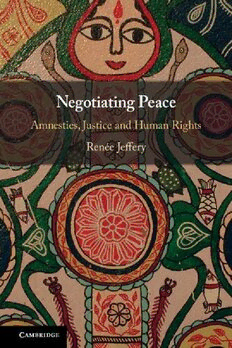
Negotiating Peace: Amnesties, Justice And Human Rights PDF
Preview Negotiating Peace: Amnesties, Justice And Human Rights
NEGOTIATING PEACE Inthepasttwodecades,peacenegotiatorsaroundtheworldhaveincreas- inglyacceptedthatgrantingamnestiesforhumanrightsviolationsisno longeranacceptablebargainingtoolorincentive,evenwhenthesigning of a peace agreement is at stake. While many states that previously saw sweepingamnestiesasintegraltotheirpeaceprocessesnowavoidamnes- ties for human rights violations, this anti-amnesty turn has been con- spicuouslyabsentinAsia.InNegotiatingPeace:Amnesties,HumanRights and Justice, Renée Jeffery examines why peace negotiators in Asia have resisted global anti-impunity measures more fervently and successfully than their counterparts around the world. Drawing on a new global datasetof146peaceagreements(1980–2015)andwithin-depthanalysis of four key cases (Timor-Leste; Aceh, Indonesia; Nepal; and the Philippines), Jeffery uncovers the legal, political, economic and cultural reasons for the persistent popularity of amnesties in Asian peace processes. É J is Professor of International Relations at Griffith University and an Australian Research Council future fellow. She is the author of nine books, including Amnesties, Accountability and Human Rights,ReasonandEmotioninInternationalEthics,TransitionalJusticein PracticeandTransitionalJusticeintheAsia-Pacific(withHunJoonKim). NEGOTIATING PEACE Amnesties, Justice and Human Rights É REN E JEFFERY GriffithUniversity UniversityPrintingHouse,CambridgeCB28BS,UnitedKingdom OneLibertyPlaza,20thFloor,NewYork,NY10006,USA 477WilliamstownRoad,PortMelbourne,VIC3207,Australia 314–321,3rdFloor,Plot3,SplendorForum,JasolaDistrictCentre,NewDelhi–110025,India 79AnsonRoad,#06–04/06,Singapore079906 CambridgeUniversityPressispartoftheUniversityofCambridge. ItfurtherstheUniversity’smissionbydisseminatingknowledgeinthepursuitof education,learning,andresearchatthehighestinternationallevelsofexcellence. www.cambridge.org Informationonthistitle:www.cambridge.org/9781108838108 DOI:10.1017/9781108937184 ©RenéeJeffery2021 Thispublicationisincopyright.Subjecttostatutoryexception andtotheprovisionsofrelevantcollectivelicensingagreements, noreproductionofanypartmaytakeplacewithoutthewritten permissionofCambridgeUniversityPress. Firstpublished2021 AcataloguerecordforthispublicationisavailablefromtheBritishLibrary. LibraryofCongressCataloging-in-PublicationData Names:Jeffery,Renée,author. Title:Negotiatingpeace:amnesties,justice,andhumanrights/RenéeJeffery,GriffithUniversity,Queensland. Description:Cambridge,UnitedKingdom;NewYork,NY:CambridgeUniversityPress,2021.|Includes bibliographicalreferencesandindex. Identifiers:LCCN2020043477(print)|LCCN2020043478(ebook)|ISBN9781108838108(hardback)| ISBN9781108947718(paperback)|ISBN9781108937184(epub) Subjects:LCSH:Pacificsettlementofinternationaldisputes.|Disputeresolution(Law)|Arbitration (Internationallaw)|Amnesty–Asia.|Humanrights–Asia. Classification:LCCKZ6010.J442021(print)|LCCKZ6010(ebook)|DDC341.6/6–dc23 LCrecordavailableathttps://lccn.loc.gov/2020043477 LCebookrecordavailableathttps://lccn.loc.gov/2020043478 ISBN978-1-108-83810-8Hardback CambridgeUniversityPresshasnoresponsibilityforthepersistenceoraccuracy ofURLsforexternalorthird-partyinternetwebsitesreferredtointhispublication anddoesnotguaranteethatanycontentonsuchwebsitesis,orwillremain, accurateorappropriate. CONTENTS List of Figures vi List of Tables vii Acknowledgements viii Introduction 1 1 Amnesties and Peace Agreements: The Asia-Pacific in Global Comparative Perspective, 1980–2015 35 2 Amnesties and Human Rights in Asia 72 3 Timor-Leste and Indonesia: Judicial Incapacity and the Politics of Reconciliation 100 4 Aceh, Indonesia: Separatism, Peace and the Role of the International Community 125 5 Nepal: From Tacit Acceptance to Noncompliance 149 6 The Philippines: Managing a Culture of Impunity in the Bangsamoro Peace Process 174 Conclusion 197 Appendix 1 Peace Agreements, 1980–2015 213 Appendix 2 Conflict Type 223 Appendix 3 Conflict Intractability 228 Appendix 4 Regional and Economic Context 233 Appendix 5 Regime Type and Dynamics 238 Appendix 6 Peace Agreements with Amnesties 245 Appendix 7 Amnesty Provisions Excluding Human Rights Violations 248 Bibliography 250 Index 292 v FIGURES 1 Peaceagreements,amnestiesandexclusionsforhumanrightscrimes, 1980–2015 43 2 Peacesettlementamnestiesandexclusionsforhumanrightsviolations:regional variations,1980–2015 47 3 Intrastateconflicts,peacesettlementamnestiesandexclusionsforhumanrights violations,1990–2015 51 4 Amnestiesandintractability,1980–1999 57 5 Amnestiesandintractability,2000–2009 58 6 Amnestiesandintractability,2010–2015 58 7 Amnesties,exclusionsforhumanrightsviolationsandincomelevel 61 8 Amnestiesandregimedynamics 63 vi TABLES 1 Caseselection 27 2 Regionalvariationsinpeaceagreements,amnestiesandintractability, 1980–2015 59 3 Amnesties,exclusionsforhumanrightsviolationsandregimetype,1980–2015 64 4 IntractabilityandUnitedNationsinvolvementinpeacenegotiations, 1980–2015 68 5 AmnestyprovisionsinAsianpeaceagreements(examples) 73 6 Asianpeaceprocesses,institutionalmembershipandtreatyratification 93 7 AmnestiesandstatespartiestotheRomeStatuteandTortureConvention: regionalvariations 96 vii ACKNOWLEDGEMENTS During the course of researching and writing this book, I have incurred manydebtsofthanks.Iwouldparticularlyliketoacknowledgeandoffer heartfeltthankstoallofthepeoplewhoagreedtotalktome,onoroffthe record, provided me with background information, shared contacts and helped to organise appointments during my many periods of fieldwork. Withoutyourtime,patienceandinput,itwouldhavetakenmeanawful lot longer to become sufficiently familiar with the intricacies of each of thecasesortoappreciatetheirnuances.ThanksinparticulartoGovinda Sharma,LiaKentandPaulHutchcroft,whoprovidedmewithinvaluable advice and assistance on my first research trips to Nepal, Timor-Leste and the Philippines. Thanks also to Dinesh Tripathi, Subodh Raj Pyakurel, Shree Krishna Subedi, Birendra Thapaliya, Kashiram Dhungana, Lokendra Mallik, Narendra Man Shrestha, Matthew Stephens, Sam Chittick, Miriam Coronel Ferrer and the staff at the Judicial Systems Monitoring Programme in Dili for your insight and time.Therearemanyotherswhohavehelpedmealongthewaybuthave asked not to be named: my sincere gratitude extends to you all without exception. To my fieldwork thanks, I must add an apology to all the people who have generously offered to take me to appointments in difficult-to-find locationsonlytofindIwouldsteadfastlyrefusetoridepillionontheback of their motorbike. I know this is how it is done throughout Asia and IrealisethatweavingourwaythroughthecrazytrafficofKathmanduor anyothermajorcityintheregionisalotfasterthansittinginseemingly intractable traffic jams, but even with the kind offers of helmets, I fear I am way too uncoordinated to avoid a serious accident! I would also like to acknowledge the engagement and feedback I have received on aspects of this research from friends and colleagues around theworld.Iamgratefulfortheopportunitiestopresentpapersfromthis project at research seminars and workshops at Oxford University, the University of St Andrews, Warwick University, the University of viii ix Uppsala, the Australian National University and Griffith University. I have also presented papers on this research at numerous conferences including those of the International Studies Association, Australian Political Studies Association and the Oceanic Conference on International Studies, as well as at East Asia Peace Conference hosted in Singapore by the East Asian Peace Program, Uppsala University and theAsiaResearchInstituteattheNationalUniversityofSingapore.Over the years I have also enjoyed talking about all things transitional justice with colleagues and friends including Karen Brounéus, Joanna Quinn, Emma Palmer, Hun Joon Kim, Susan Harris-Rimmer and Kirsten Ainley. The loss of Chandra Lekha Sriram during the course of this project remains a source of ongoing sadness. Every time I see her name referencedorciteherworkmyself,Iamremindedthatwehavealllosta great scholar and friend, someone who was, in my experience, always ready with the encouragement, guidance and help I needed. Along with fostering my early interest in transitional justice (while I was still lost in the depths of early modern political thought) and providing me with so much actually useful advice about conducting fieldwork in risky places, she provided many of us with a safe haven, a listening ear and a decent meal while we were PhD students. It is, I think, fitting that my last two memoriesofherarebothofspectacularlyfunnightsoutwithgreatfood, wine, laughter and debate in Singapore and London. This research was funded by an Australian Research Council (ARC) Discovery Grant project on ‘Amnesties and peace accords in the Asia- Pacific’(DP140102360)whichranfrom2014to2016buttookconsider- ably longer to finish than I originally anticipated. It overlapped with another ARC project on ‘The impact of political reconciliation in the Asia-Pacific’withJoanneWallisandLiaKent.WorkingwithJoanneand Lia was a great experience and one that I hope to repeat in the future. Hopefully,nexttimelifewon’tthrowusquitesomanycurveballs!Inany case, I wanted to thank you both for your patience and perseverance as I juggled the two projects. Thankyoutothe research assistantswhohaveworkedonthisproject at various stages. Sophie Saydan was of immense help in gathering and categorisingall the initial dataon peace agreements.Caitlin Mollicaalso providedassistanceintheearly andmiddlestagesoftheproject andhas since become a colleague and collaborator. More recently, Bikram Timilsina has provided research assistance for the chapter on Nepal. I thank them all for their efforts.
